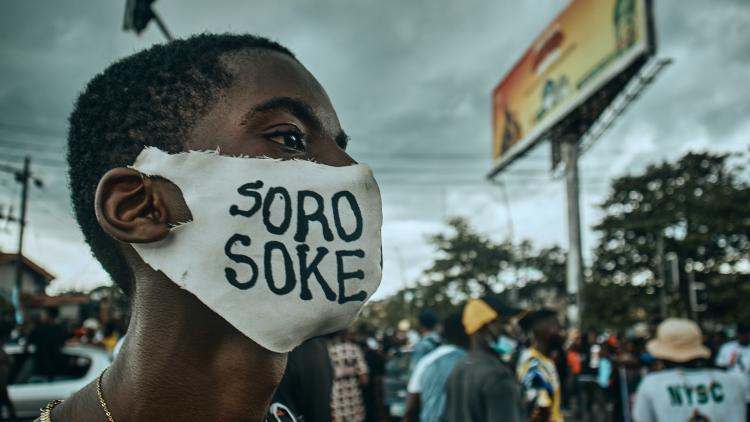The importance of Black feminist connections, activism, and resistance across continents


|
Amo porque vivo, vivo y soy feliz de cultivar un legado que debe persistir. Tengo una mission muy dentro de mí, la tradición oral que debe perdurar. En la medidaa que se narre a los hijos nuestra historia, los nietos y sobrinos la tendrán en la memoria. Con los saberes que recuerden ellos deben de escribir la historia de un pueblo que supo resistir. No bajaron la cabeza, Nos dejaron la historia Toca, que escribirla pa’ que elm undo la conozca.
|
I love because I live I live and I am happy to cultivate a legacy which must persist. I have a mission deep inside of me, of oral tradition that must last. To the extent that it is narrated to the children to tell our history, our grandchildren and nephews will have it in their memory. With the knowledge they remember they must write the story of a people who knew how to resist. They did not lower their heads They left us the story It's time to write it so that the world will know them, you, and me. Alba Nelly Mina, Mi África yo soy Zaza Min Yaré (2018) |
I use these words by Colombian activist and educator Alba Nelly Mina to reflect and acknowledge all that has been done, and that which is to come. I reflect on Black History Month by celebrating connections across continents, across communities and in celebration of activism and Black feminism.
This September, I travelled to Colombia as a guest of The Black Feminist Fund accompanying my dear friend, feminist activist and educator Kym Oliver of the Triple Cripples. The dynamic duo that is Kym Oliver and Jumoke Abdullahi, disabled Non-Binary Black women created a platform for disabled Black women, femmes, and Non-Binary POC living with disabilities, those whose stories remain hidden from view, from the discourse. It is because of these stories, about race, care, bias, and being on the outside that Kym and I connected. This connection brought us to Colombia to celebrate Black Feminists whose stories, activism and resistance need acknowledgement and recognition.
The Black Feminist Fund is the first global institution of its kind ambitiously funding movements doing powerful transformative and intersectional work. The Black Feminist Fund had its first meeting bringing together amazing Black women and gender-expansive people from across the globe who are shifting the power dynamics of philanthropy and activism. Envisioning a solidarity fund that Black women deserve that works with them to transform societies, systems of oppression, cultures, and economies. A movement that centres the Black experience.
For this reason, we met with Columbia’s first Black vice president, Francia Marquez. A woman who has become a symbol of hope for the most marginalised groups in Colombia. As a woman of Afro-Colombian descent, she has been at the forefront of Colombian activism advocating for Black and Indigenous communities fighting to preserve their land and history. Francia Marquez’ election was a victory for Black people, for single mothers, for activists, and for those ignored by Colombia’s elites. Marquez studied law and entered politics in 2020 to win the election in June of this year.
This historical win is a significant message in a country that has the second-largest population of African descent in Latin America. A message Marquez wishes to give hope to others across the African diaspora, a connection which must bring political attention to the relationship between colonialism, sexism, racism, and political representation. A commitment around education and decolonisation which centres on Black women, and Indigenous communities, and challenges the status quo across the globe.
The Black feminists who came together in Colombia to celebrate this win, to acknowledge this historical shift have revelled in the words Marquez shared with us, her vision for the future, for education, and for the transnational networks which must be created and maintained to continue to make lasting and transformative change.
The vice president, The Black Feminist Fund, and the community of Black feminists reaffirmed commitments to further educational needs, decolonisation, and protection of women and Indigenous people’s rights across the globe which all inform my work at SOAS. The way we approach our teaching and learning at SOAS is responsive to the communities and environments we specialise in and the students/colleagues we attract. As Programme Convenor for the MA Gender Studies and Law, I get to engage and introduce students to new conversations in the field, new considerations for their area of work, and ideas to explore in future studies, but more importantly, the lived experience is centred in a way that always holds value to what we aim to contribute at SOAS; The World’s University, a leading voice in The Academy.
I look forward to foregrounding these commitments and transnational connections with my work and contributions in the future with The Feminist Centre for the Study of Racial Justice and the Transnational Research Network Challenging Anti-Blackness led by Dr Awino Okech. The transnational connections made in Colombia have confirmed the need to engage in more inclusive and transformative dialogues across the diaspora, a diaspora celebrated at SOAS where its roots are ever-expanding.
About the author
Dr Sidonia Lucia Kula is a Lecturer in Law and Gender and the Programme Convenor of MA Gender Studies and Law. An International Human Rights Lawyer, her research focuses on an interdisciplinary study of international law, forced migration and gendered violence through an auto-ethnographic lens. Find out more.




